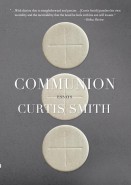
Book Review: Communion by Curtis Smith

Communion: Essays
Nonfiction by Curtis Smith
Dock Street Press, March 2015
ISBN-13: 978-099165738
$12.00 US; 154pp.
Reviewed by Rebecca Skidmore Biggio
In Communion, Curtis Smith explores fundamental human relationships, particularly those which define who we are and who we become. Although Smith focuses much of the book on parent-child relationships, the environment of Smith’s personal experience is merely a beautiful vehicle for his investigation of larger human truths that are perfectly illustrated by, but by no means exclusive to, the father-son relationship that dominates Smith’s present.
The truths in Smith’s essays are relatable even for readers who do not yet know the specific heartache, for example, of aging parents. In the title essay, Smith describes his increasingly frail mother: “She’s bony, too thin. The worrying component of our relationship has shifted.” Smith’s own experiences feel unobtrusive, mere backdrop for his deeper exploration of the human condition. “Perhaps worry,” he muses, “is love’s painful offshoot, its amount constant, its division dictated by health and years.”
In the same essay, Smith uses his son’s First Communion to explore the juxtaposition between the end of his mother’s life, which he fears “is shutting down one avenue at a time,” and the beginning of his son’s life as a young man, competent and accountable. Smith describes the First Communion, for children, as “another one of their entries into our world” and marvels at how “this ritual takes place at the age of a child’s dawning awareness of self.” It is a time for the father’s growth, as well, as he recognizes his own evolving place in his son’s life and in the inevitable cycles of aging and maturity. For someone who describes his relationship to faith as “admiration”, or a “tug of spirit,” the communion ritual offers both father and son a chance to experience the passing of the mantle of responsibility. “Whatever worries I possessed at the Mass’s start have faded,” Smith writes. “He’s a child, yes, but there is something very basic about him that I trust. What form faith assumes in his life will be his decision. Today, I’m reassured he will take something good from all this.”
The subsequent essays in this collection follow the same basic pattern as “Communion.” Reading each essay is like having a cathartic conversation with a good friend over a nice cup of coffee. Smith’s essays explore some weighty issues: religion, spirituality, parenting, aging, trust, responsibility, memory, choice, love, and fear. Yet, the tone and presentation of Smith’s work is so casual, so familiar, so open to uncertainty, that the wisdom he imparts never feels preachy or overwrought. His words are both comforting and profound: “There is grace in this moment. There is beauty. There is history and weight. Here are our children, as we were once children.” There is a gentleness about Smith’s storytelling, and an overt ownership of mistakes and the potential for mistakes.
The inclusive appeal of this collection is this conversational quality, the give and take. Smith stands in for that friend who can put into just the right words that emotion you can’t quite vocalize on your own. In Communion, Smith somehow manages to be both storyteller and good listener.
Rebecca Skidmore Biggio is a Mentor for the Afghan Women’s Writing Project. Her critical essays have appeared in Arizona Quarterly and African American Review.

Leave a Reply